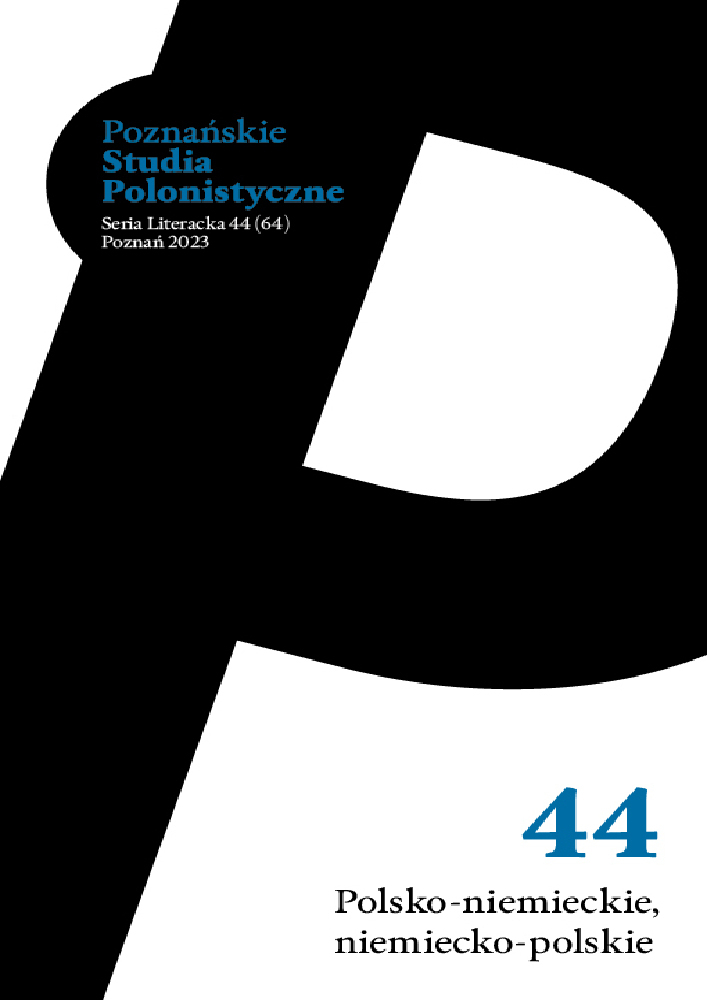Abstrakt
This article is an analysis of two autobiographical texts by famous Polish painters of the turn of the century: Julian Fałat’s Pamiętniki (Diaries) from 1935 and Wojciech Kossak’s Wspomnienia (Reminiscences) from 1913. These texts constitute a source of information not only about the life of Polish artists at the imperial court in Berlin, but also a treasury of historical knowledge about the moods prevailing in the Wilhelmine era, the Polish–German relations in particular. In both texts, the most important figure is that of the German emperor, his involvement in the affairs of art and concern for the fate of outstanding Polish painters. The analysed texts allowed, above all, for showing the difficulties in Polish–German relations at the turn of the century, the ambivalence of the German emperor in relation to the Polish issue and individual Poles, and the difficulties of Polish artists in maintaining the balance between being the court painter of the German emperor and a Polish patriot.
Bibliografia
Fałat Julian (1935), Pamiętniki, Księgarnia F. Hoesicka, Warszawa.
Kossak Wojciech (1973), Wspomnienia, wyd. 2, PAX, Warszawa.
Balfour Michael (1996), Der Kaiser Wilhelm II. und seine Zeit, Ullstein Verlag, Berlin.
Berger Karl (1915), Kaiser Wilhelm II., Velhagen & Klasing, Bielefeld.
Boockmann Hartmut (1981), Der deutsche Orden. Zwölf Kapitel aus seiner Geschichte, C.H. Beck, München.
Everling Friedrich (1917), Kaiserworte, Trowitzsch & Sohn Verlag, Berlin.
Fechner Helmuth, red. (1964), Deutschland und Polen 1772–1945, Holzner Verlag, Würzburg.
Haffner Sebastian, Venohr Wolfgang (1980), Preußische Profile, Ullstein Verlag, Königstein.
Hartau Friedrich (1978), Wilhelm II., Rowohlt Taschenbuch, Hamburg.
Herre Franz (1998), Wilhelm II. Monarch zwischen den Zeiten, Heyne Verlag, München.
Hoensch Jörg K. (1998), Geschichte Polens, Ulmer Verlag, Stuttgart.
Klaußmann Oskar, red. (1902), Kaiserreden. Reden und Erlasse, Briefe und Telegramme Kaiser Wilhelms des Zweiten. Ein Charakterbild des Deutschen Kaisers, J.J. Weber, Leipzig.
Kossak Adalbert von (1913), Erinnerungen, Morawe & Scheffelt, Berlin.
Kracke Friedrich (1960), Prinz und Kaiser. Wilhelm II. im Urteil seiner Zeit, Olzog Verlag, München.
Kubiatowski Jerzy (1987), Maciej Mikołaj Radziwiłł, w: Polski słownik biograficzny, t. 30, red. Andrzej Romanowski, Polska Akademia Umiejętności, Zakład Narodowy im. Ossolińskich, Kraków, Wrocław, s. 288–289.
Malinowski Jerzy (1935), Posłowie, w: Julian Fałat, Pamiętniki, Księgarnia F. Hoesicka, Warszawa, s. 206–207.
Makuszyński Kornel (1985), Kartki z kalendarza, red. i wstęp Krystyna Kuliczkowska, Śląski Instytut Wydawniczy, Kraków.
Matthes Alex, red. (1976), Reden Kaiser Wilhelms II., Rogner und Bernhard, München.
Röhl John (1990), Wehe dem, wem ich zu befehlen haben werde – Kaiser Wilhelm II, w: Deutschland. Ein historisches Lesebuch, red. Rainer Beck, C.H. Beck, München, s. 299–307.
Sombart Nicolaus (1997), Wilhelm II. Sündenbock und Herr der Mitte, Volk und Welt, Berlin.
Wippermann Wolfgang (1979), Der Ordensstaat als Ideologie. Das Bild des Deutschen Ordens in der deutschen Geschichtsschreibung und Publizistik, Colloquium-Verlag, Berlin.
Wojtczak Maria (1998), Literatur der Ostmark. Posener Heimatliteratur 1890–1918, Wydawnictwo Naukowe UAM, Poznań.
Wulff Erwin (1918), Die persönliche Schuld Wilhelms II. Ein zeitgemäßer Rückblick, Illustrierter Deutscher Reichskalender, Dresden.
Wysocki Alfred (1958), Sprzed pół wieku, Wydawnictwo Literackie, Kraków.
Zitzewitz Hasso von (1991), Das deutsche Polenbild in der Geschichte. Entstehung – Einflüsse – Auswirkungen, Böhlau Verlag, Köln.
Licencja
Prawa autorskie (c) 2023 Justyna M. Krauze-Pierz

Utwór dostępny jest na licencji Creative Commons Uznanie autorstwa – Bez utworów zależnych 4.0 Międzynarodowe.
Autorzy
Autorzy tekstów przyjętych do publikacji w czasopiśmie „Poznańskie Studia Polonistyczne. Seria Literacka” są zobowiązani do wypełnienia, podpisania i odesłania na adres redakcji umowy o udzielenie nieodpłatnej licencji do utworów, z zobowiązaniem do udzielania sublicencji CC.
Zgodnie z umową, autorzy tekstów opublikowanych w czasopiśmie „Poznańskie Studia Polonistyczne. Seria Literacka” udzielają Uniwersytetowi im. Adama Mickiewicza w Poznaniu niewyłącznej i nieodpłatnej licencji oraz zezwalają na użycie sublicencji Creative Commons Attribution-NoDerivatives 4.0 International (CC BY-ND 4.0).
Autorzy zachowują prawa do dalszego, swobodnego rozporządzania utworem.
Użytkownicy
Zainteresowani użytkownicy internetu uprawnieni są do korzystania z utworów opublikowanych od 2016 roku w „Poznańskich Studiach Polonistycznych. Serii Literackiej” pod następującymi warunkami:
- uznanie autorstwa – obowiązek podania wraz z rozpowszechnionym utworem, informacji, o autorstwie, tytule, źródle (odnośniki do oryginalnego utworu, DOI) oraz samej licencji;
- bez tworzenia utworów zależnych – utwór musi być zachowany w oryginalnej postaci, nie można bez zgody twórcy rozpowszechniać np. tłumaczeń, opracowań.
Do wszystkich tekstów opublikowanych przed 2016 r. prawa autorskie są zastrzeżone.
Inne
Uniwersytet im. Adama Mickiewicza w Poznaniu zachowuje prawo do czasopisma jako całości (układ, forma graficzna, tytuł, projekt okładki, logo itp.).

